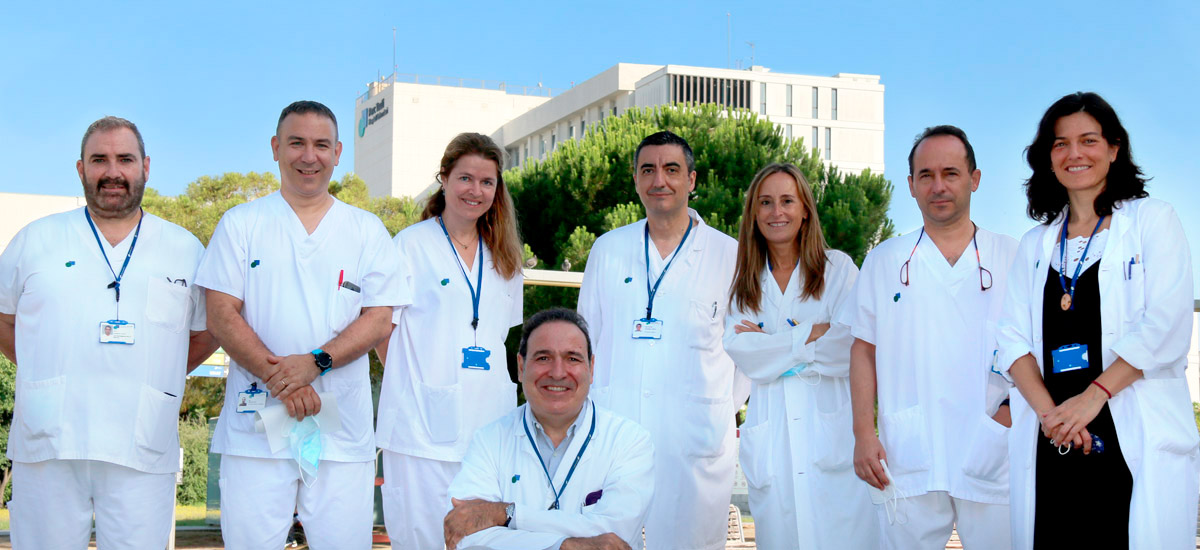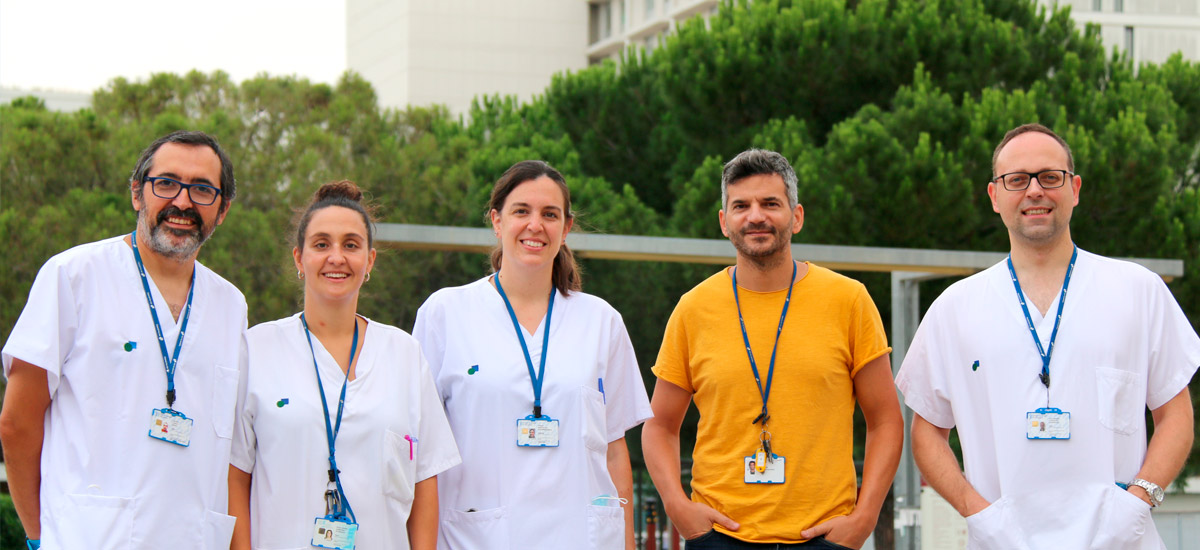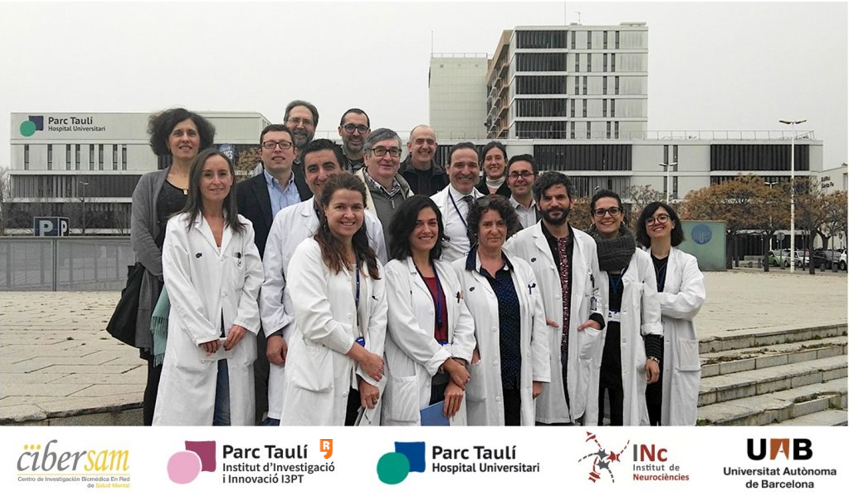Mental Health and Neuroscience
- About the area
- Groups
- Mixed Unit
The Neuroscience and Mental Health research area is made up of a multidisciplinary group: psychiatry, neurology, psychology, neuropsychology, nursing, rehabilitation medicine, genetics and other research members with a common interest in improving knowledge and approach. of neurological and psychiatric diseases.
Within this objective, part of the studies have an epidemiological approach, with the interdisciplinary participation of professionals and different research methodologies. The groups develop studies in different areas (neurodegenerative diseases, schizophrenia, bipolar disorders, autism, depression, sleep pathology, epilepsy, neurovascular diseases, multiple sclerosis, genetically based developmental diseases) to improve the functionality and prevention of diseases. We also collaborate in different projects with the administration and national and international research groups in order to develop ICT and improve the transfer of these results to patients and professionals.
Based on this activity, the area has been recognized with two consolidated research groups and one pre-consolidated, by the Agency for the Management of University and Research Grants (AGAUR) of the Generalitat de Catalunya.
Research groups in the area of Mental Health actively collaborate in national and international research networks. It is worth noting its recognition as a CIBERSAM Consolidated Group (CB19 / 09/00029) and the creation of the Mixed Unit with the Autonomous University of Barcelona in 2017, currently consolidated and developing translational and impact research projects.
Strategic lines of the area
- Application of new digital technologies in the diagnosis and treatment of mental health pathologies.
- Prevention and promotion of mental health in the young adult population.
- Translational research for the development of specific markers and biomarkers for the diagnosis and treatment of mental health pathologies.


Group A3G5 - E-mental health and epidemiology
Accreditation level: Consolidated group
Our original group has been the driving force behind the I3PT Neuroscience and Mental Health Area, promoting the development of other groups with which we work synergistically and in a network. Our group currently consists of a multidisciplinary team of psychology, psychiatry and nursing professionals.
Our group, recognized by the Generalitat de Catalunya (SGR 2017 1412), has been able to attract talent and form solid alliances with the INc-UAB, forming a group linked to the CIBERSAM network of ISCiii CB19 / 09/00029 led by the IP of the Group. On the other hand, he has promoted the constitution of the UAB Joint Unit for Translational Neuroscience, which he co-directs.
Our research is based on the epidemiological research of mental disorders, especially in primary care, study of risk factors from suicide (biological and psychosocial) and multilevel preventive interventions. Our group also studies the prevention and promotion of mental health at the child and adolescent level and the development, implementation and evaluation of e-Mental Health projects. Recently the group has integrated in the “Network of Innovation of New Technologies in Mental Health - TECSAM” (AGAUR-FEDER / Code: IU68- 013.943).
Lines of research
- Studies for the prevention of depression and suicidal behaviors: clinical and biological factors that may have a potential predictive capacity for risk or therapeutic response in behaviors.
- Epidemiology of mental disorders in Primary Care.
- Development and validation of e-Mental Health projects.
- Prevention and promotion of mental health for young people.
- Innovation in the treatment and prevention of depression.
Composition of the group
Diego Palao Vidal (Group leader) | ORCID
Doctoral research staff
- Cánovas Verge, David
- Cebrià Mecca, Anabel
- Fernández Gonzalo, M. Soledad
- Fradera Jiménez, Marc
- Granero Lázaro, Albert
- Jodar Vicente, Mercè
- Martínez Amorós, Erika
- Pamias Massana, Montserrat
- Parra Uribe, Isabel
- Peña Gómez, Cleofé
- Sansa Fayos, Gemma
Predoctoral
- Aguilar Fernandez, Alfredo
- Bassa Mercadé, Adriana
- Commander Vázquez, Laura
- Gálvez Ortiz, Veronica
- Guinovart Julián, Martí
- Martínez Amorós, Erika
- Masons Capdevila, Carme
- Members Martin, Sonia
- Merodio Ruiz, Igor
- Pujals Altés, Elena
- Reina López, Nuria
- Soley Mateu, Bernat
Non-doctoral research staff
- Fucho Rivers, Genís Felip
- Gracia Liso, Rebeca
- Hervàs Pujol, Mariona
- Pujol Riera, Cristina
- Puntí Vidal, Joaquim
Associated professionals
- Acebillo Bacchus, Siddartha
- García Encinas, Maria Angelica
- García Carreira, Carmen
- Pérez Bonaventura, Iris
- Ribera Perpiña, Gisela
- Santamaria Schaaf, Miriam

Group A3G6 – Psychoneuroendocrinology and Stress in Psychosis (PSICPNEC)
Accreditation level: Consolidated group
The group 'Psychoneuroendocrinology and stress in psychosis' (PSICPNEC) is composed of researchers from the Mental Health Service of Parc Taulí Hospital, some of whom are UAB professors. The main scientific interest of the group is to study the relationship between hormones and behavior (Psychoneuroendocrinology) in patients with a psychotic disorder. The lines of work include the study of the neurobiological mechanisms of stress (hypothalamus-pituitary-adrenal axis) in the etiopathogenesis and prognosis of psychotic disorders. The lines of research include the study of the role of hormones in the risk of transition to psychosis in vulnerable populations and the association with a more severe phenotype (eg, cognitive impairment) in established psychoses. Other lines are focused on the study of the role of gender and hormones in the therapeutic response to pharmacological, psychotherapeutic and cognitive rehabilitation interventions in psychotic disorders.
In recent years, the group has received competitive funding at European level (ERA-NET project on stress biomarkers in psychosis) and nationally (two FIS projects). Two researchers from the group have received an intensification of research activity for the PERIS strategy (Xavier Labad and Itziar Montalvo) and also for the Carlos III Institute of Health (Xavier Labad).
Lines of research
- Biomarkers of stress and risk of developing a psychotic disorder.
- Impact of hormones on the clinical expression of psychotic disorders.
- Neurocognition and social cognition in emerging psychotic disorders: prognostic and therapeutic implications.
- Psychopathological and biological consequences of abuse in adolescents and young adults.
Composition of the group
Itziar Montalvo Aguirrezabala (co-head of group) | ORCID
Doctoral research staff
- Barbero Valverde, Juan David
- Cobo Gómez, Jesús
- Ferrer Alberti, Alex
Predoctoral
- Crosas Armengol, Josep
- Estrada Coma, Francesc
- Tost Bonet, Meritxell
Non-doctoral research staff
- Aguayo Navarro, Raquel
- Sagues Junqueras, Teresa
Associated professionals
- Acebillo Bacchus, Siddartha
La Translational Neuroscience Unit, set up in 2018, is a collaboration platform between clinical and basic researchers from the Parc Taulí Research and Innovation Institute (I3PT) and the UAB Institute of Neurosciences (INc-UAB). It is through this structure that the INCs recognizes the U3PT Neuroscience and Mental Health Area as an Associate Research Unit of the UAB.

The UAB Institute of Neurosciences (INc-UAB) is made up of neuroscientists who study how healthy and diseased brains work. The specialties of the more than 200 members of the INC research groups fall into the following strategic areas: Neurodegeneration and Aging, Neurodegeneration and Repair and Behavioral Neuroscience. The INC publishes more than 100 scientific articles a year in the most prestigious journals in Neuroscience and its researchers obtain public and private funding both nationally and internationally. In addition, we have services in Histology, cell culture, microscopy, behavior and stereotaxy that support researchers from our institute and other public and private institutions. Our main goals are excellence in the study of the nervous system, to promote translational research and to transfer this knowledge to society. In order to understand the basics of how the brain works we use both animal models, cell cultures, computational models, and human studies.
The objectives of the Translational Neuroscience Unit are:
- Develop projects for improve the knowledge of the neurobiological basis of neuropsychiatric and neurological disorders by mixed research teams that carry out the clinical validation of the results obtained in basic research, the identification of biomarkers applicable to the detection, diagnosis, therapeutics and prognostic evaluation of these disorders.
- Develop research projects that require systematic and efficient psychophysiological, neurophysiological and / or neurocognitive evaluation, in the study of neurodevelopmental disorders, neuropsychiatric disorders and the effects of psychoactive treatments.
- Enhance the pre and postdoctoral teaching in translational neuroscience research, for the training of researchers of excellence.

Responsible
- Diego J Palao Vidal
Members
- Narcís Cardoner Alvarez
- Javier Labad Arias
- Montserrat Pamias Massana
- Isabel Parra Uribe
- Ana Roche Martinez
- Montserrat Torras Tomorrow
- Victoria Aldecoa Bilbao
- Mercè Jodar Vicente
- Gemma Sansa Fayos
- David Cánovas Vergé
- Marion Hervas Pujol
- Miriam Guitart Feliubadalo
- Victor Pérez Riverola
- Marta Subirà Corominas
- Albert Barn Lazarus
- Aida Alvarez Pedrero
- Itziar Montalvo Aguirrezabala
- Soledad Fernández Gonzalo
- Ximena Goldberg Hermo
- Annabel Cebrià Mecca
- Joan Visa Bombardment

Responsible
- Jesús Giraldo Arjonilla
Members
- Raul Andero Gali
- Antonio Armario Garcia
- Carlos Barcia Gonzalez
- José R. Bayascas Ramírez
- Esther Dalfó Chapel
- Albert Fernández Teruel
- Lydia Giménez Llort
- Margarita Martí Nicolovius
- Ester Martínez Membrives
- Beatriz Molinuevo Alonso
- German Christmas rose
- Jordi Ortiz de Pablo
- Olga Paul Rigau
- Albert Quintana Romero
- Elisenda Sanz Iglesias
- Carlos Saura Antolin
- Adolf Tobeña Pallarés
- Rafael Torrubia Beltri
Goldberg, X., Espelt, C., Palao, D., Nadal, R., & Armario, A. (2020). Adaptability to acute stress among women survivors of intimate partner violence: a protocol for a mixed-methods cross-sectional study in a laboratory setting (BRAW study). BMJ open, 10(10), e036561. | see post
Labad, J., Salvat-Pujol, N., Armario, A., Cabezas, Á., Arriba-Arnau, AD, Nadal, R.,… & Soria, V. (2020). The Role of Sleep Quality, Trait Anxiety and Hypothalamic-Pituitary-Adrenal Axis Measures in Cognitive Abilities of Healthy Individuals. International journal of environmental research and public health, 17(20), 7600. | see post
Belda, X., Fuentes, S., Labad, J., Nadal, R., & Armario, A. (2020). Acute exposure of rats to a severe stressor alters the circadian pattern of corticosterone and sensitizes to a novel stressor: Relationship to pre-stress individual differences in resting corticosterone levels. Hormones and Behavior, 126, 104865. | see post
Armario, A., Labad, J., & Nadal, R. (2020). Focusing attention on biological markers of acute stressor intensity: Empirical evidence and limitations. Neuroscience & Biobehavioral Reviews, 111, 95-103. | see post
Tost, M., Monreal, JA, Armario, A., Barbero, JD, Cobo, J., García-Rizo, C.,… & Labad, J. (2020). Targeting hormones for improving cognition in major mood disorders and schizophrenia: thyroid hormones and prolactin. Clinical drug investigation, 40(1), 1-14. | see post
Labad, J., Soria, V., Armario, A., Nadal, R., Monreal, JA, & Palao, D. (2019). Levothyroxine treatment for persistent cognitive symptoms in major depression. Journal of Psychiatry and Mental Health, 12(3), 199-200. | see post
Labad, J., Armario, A., Nadal, R., Solé, M., Gutiérrez-Zotes, A., Montalvo, I.,… & Vilella, E. (2018). Clinical correlates of hypothalamic-pituitary-adrenal axis measures in individuals at risk for psychosis and with first-episode psychosis. Psychiatry research, 265, 284-291. | see post
Montalvo, I., Nadal, R., Armario, A., Gutiérrez-Zotes, A., Creus, M., Cabezas, Á.,… & Labad, J. (2018). Sex differences in the relationship between prolactin levels and impaired processing speed in early psychosis. Australian & New Zealand Journal of Psychiatry, 52(6), 585-595. | see post
The project BioStress, coordinated by Dr. Raül Andero, aims to find biological and psychological biomarkers that can predict the likelihood that a person suffering from a traumatic event will then develop post-traumatic stress disorder and depression.
The project GEPI-BIOPSY, coordinated by Dr. Javier Labad, seeks to determine biomarkers that may be useful in the diagnosis and monitoring of schizophrenia.




